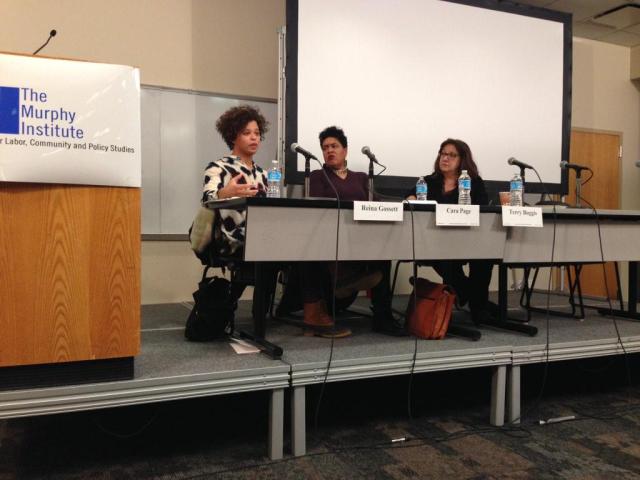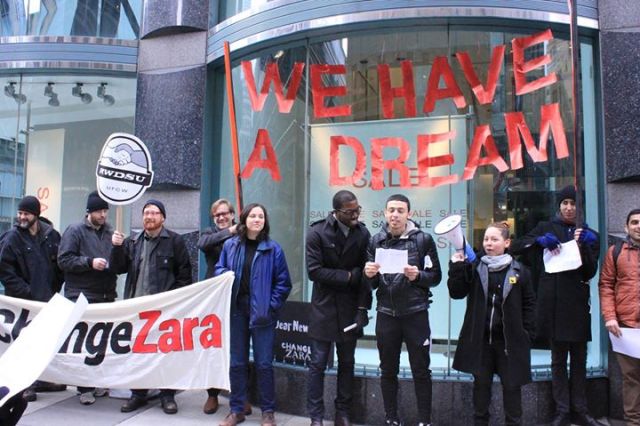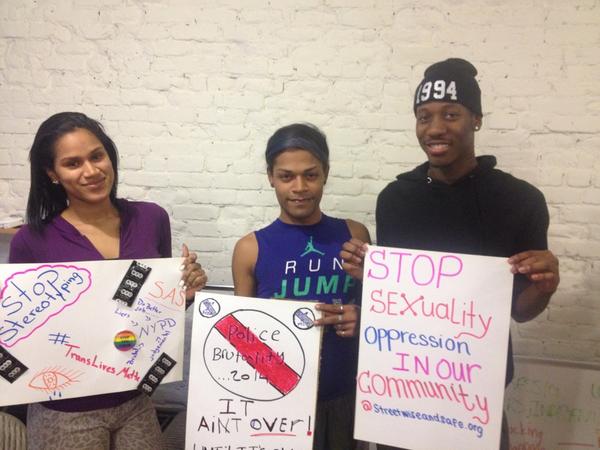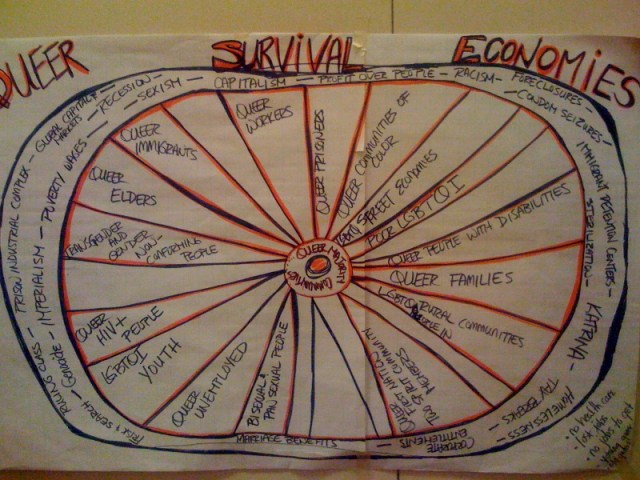Economic injustice hits queer and trans people hard. We’ve covered how queer people of color are uniquely affected by barriers to employment, how trans people are vulnerable to incredibly high rates of violence and discrimination, how bisexual women are subject to higher levels of mental and physical health issues, and how queer and trans people are disproportionately affected when programs like unemployment and food stamps are cut. At Autostraddle, we’ve experienced the challenges of sustaining ourselves while we work to sustain this business run for and by queer women, because there’s not a lot of money out there supporting queer women’s media that queer women actually make.
Sometimes, it can be hard to parse out exactly why queer and trans people have such a hard time getting by while the headlines would suggest we are advancing by leaps and bounds. On January 23rd and 24th, queer and trans people converged in New York City for the Invisible Lives, Targeted Bodies Conference to explore how the struggle for queer and trans justice and liberation is inextricably linked to struggles for economic, racial, immigrant, disability and reproductive justice. The conference, was part of the Queer Survival Economies initiative at the Barnard Center for Research on Women (BCRW), run by Amber Hollibaugh. Hollibaugh is the former executive director of Queers for Economic Justice, an organization which closed last year because of the very economic issues it was formed to address.
Hollibaugh said, “The title of the conference is “Invisible Lives, Targeted Bodies” because on the one hand, we’re never referred to as having the economic problems, and yet we are particularly targeted when we try to survive.”
Panelist Veronica Bayetti Flores said, “When we’re talking about queer bodies, immigrant bodies, black and brown bodies, disabled bodies, those disrupt white supremacy and heteropatriarchy — and that’s the context in which we see a lot of criminalization of these communities. When I think of queer survival economies, I think of bodies that disrupt the social order by surviving, existing and thriving.”
Reina Gossett also pointed out how visibility can create conditions for bodies to be more heavily targeted: “Violence against trans women of color has risen, and visibility of trans women of color has risen, so those things have happened at the same time: visibility going up, and violence going up.”

Reina Gossett, Cara Page and Terry Boggis discuss reproductive justice and healthcare access. via @MargotDWeiss
The conference was sponsored by the Murphy Institute, BCRW, the Retail Action Project, and the Retail, Wholesale and Department Store Union. Janet Jakobsen, director of the BCRW, spoke to the potential of collaboration across activists, unions and academics: “It’s absolutely crucial for activists in social justice that we build knowledge and that we do so in a way that empowers people.”
Invisible Lives, Targeted Bodies highlighted struggles that are typically left out of single-issue LGBT causes like the fight for marriage, or even the fight for employment nondiscrimination laws. If LGBT organizing is just about marriage, then it’s easy to erase the narratives of people who aren’t interested in marriage, or for whom marriage doesn’t solve all their problems. If labor organizing is just about what goes on in the workplace, it’s easy to erase people with disabilities, immigrants or people who are gender non-conforming, many of whom can’t get jobs at all.
Organizing In and Outside Unions
The conference heard from organizers that do work in and outside of union models. SEIU 1199 LGBTQ Caucus member Carmen Acosta pointed out that queer economic justice isn’t just about queer visibility in the labor movement — it’s also about bringing labor organizing to queer organizations. Acosta organized with healthcare professionals at the Callen-Lorde Clinic in New York. Acosta said, “We got a yes vote for becoming members of 1199 SEIU, and they’re mostly transgender and LGBTQ people.” Kenyon Farrow another former executive director of Queers for Economic Justice discussed early conversations at QEJ around working conditions in so-called “gay establishments,” like bars and drag clubs in Chelsea, and what happens to older people as they age out of work that happens in cash economies and don’t have access to social security or other state benefits.
Conference-goer Aya, who writes at the Bad Black, spoke to the importance of developing businesses that serve queer people without being exploitative. “I’m thinking about creating our own businesses and things that we’re proud of and that don’t fund our oppression.”
Yana Calou and isis from the Retail Action Project (RAP) discussed organizing workers from various retail stores around wage theft and scheduling. RAP partnered with Make The Road New York to investigate hiring discrimination against trans and gender-non-conforming people. While RAP is based in New York City, Calou pointed out that organizing amongst retail workers can happen anywhere:
“Whether or not you have the union, there are always going to be more of you than there are your boss…You always have the ability to walk out collectively, whether or not you have a workers’ center. You always have the ability to come together and say, “what are our demands? what are the things that are bothering us? We’re going to collectively write a letter and say, ‘we don’t care what your excuse is, we want more hours.” Workers can shut a store down completely by calling in. Workers can do creative things without unions like calling out sick altogether to protest a lack of paid sick days, And when workers work together, whether or not they have the protection of a labor union, it’s protected activity.”

RAP organizers call for a wage increase outside the Zara flagship store in Manhattan via RAP
RAP member isis spoke to her experiences while working in a clothing store for 11 years, including during her transition. Isis experienced harassment from management, who told her she needed to “pick one gender or the other,” because she was “distracting” employees and customers, but when she tried to emulate the style of her manager, she was accused of dressing provocatively.
Riya Ortiz from Damayan Migrant Workers Association and Daniel Puerto from Make the Road New York discussed organizing across immigrant worker communities and building worker co-ops.
Economic (In)justice Beyond The Workplace
But the conference wasn’t limited to discussions of labor organizing, because economic injustice isn’t just about what happens in the workplace; it’s about the broad structural barriers that keep queer people from being able to survive and thrive. This happens in a lot of ways. Here are a just a few:
- intense policing of queer and trans people of color by local law enforcement, immigration officials and federal surveillance agencies
- the exclusion of people with disabilities and older people from workplaces and organizing spaces
- being denied access to adequate medical care
- histories — and present realities — of eugenicist practices that have targeted the bodies of women of color, trans and queer people
- anti-black racism within white queer communities and other communities of color
- policing of homeless people
- criminalizing sex workers and people profiled as sex workers
The Disability Justice Collective spoke to how ableism and stigma/discrimination surrounding mental illness are central to the dynamics that create economic injustice for disabled and queer people within capitalism:
“…there’s shame around being sick and disabled, which directly correlates to tropes of laziness, undeserving, sucking the system — much like harmful stereotypes against trans community, migrant community, fat community, communities of people of color… Disability and illness are more likely to happen for people who are already vulnerable and marginalized within current dominant culture. Those are the ones who are forced into exploitative, dangerous, non-unionized, physical labor and menial work in underground economies, due to their citizenship status, educational background, racism, classism, transphobia and misogyny. …Oppressive, discriminatory, exploitative, and inhumane working conditions mean LGBTQI people of color and poor whites experience high levels of state control and low levels of respectful support and resources. Consequently, we live with high levels of physical and psychological fatigue, injuries, disabilities and illness.”
Several panelists pointed to the connections between economic injustice and the prison industrial complex, and the disproportionate impact these have on queer and trans communities of color. Andrea Ritchie and Flores, who both work with Streetwise and Safe, both stressed that when it comes to the policing of queer and trans people, it’s queer and trans people of color who are the primary targets of police abuse and violence. The We Deserve Better report by BreakOUT in New Orleans and Streetwise and Safe in New York found that 87% of their youth respondents of color had been approached by police, as opposed to 33% of white respondents. In Queers for Economic Justice’s “A Fabulous Attitude” 29% of their sample, which was 85% people of color, had been strip-searched by police, and 1/5 had been physically assaulted, and these numbers were higher for trans and cis women and homeless people.

Streetwise and Safe demand an end to police brutality. via @SASYOUTHNYC
This targeting happens through various means. Police profile trans women of color — particularly black trans women. Homeless people are criminalized for sleeping or having sex in public places when there’s literally nowhere else for them to be. Broken Windows policing and Stop and Frisk lend themselves to criminalizing queer and trans bodies because, as Flores noted, officers are trained to “go with their guts,” and to ask questions if something doesn’t feel “right.” This means that gender non-conformity is literally read as a sign of criminality and as reason for officers to conduct invasive searches to determine people’s gender.
Increased contact with police means people are at risk of being incarcerated in prisons where they are subject to extremely violent conditions. Formerly incarcerated people then face incredible obstacles to finding employment, often turning back to illegal economies because it’s the only way they can make money to survive.
Wow, There Is So Much More To Be Said About This
I couldn’t transcribe the whole conference right here (though I basically tried, if you want to see my notes), so I would strongly recommend you hear straight from conference panelists themselves, many of whom have organized and developed these analyses across their communities for years, in the video footage of the conference. If you have several hours, pull them up and watch, or listen while you make art or something. Here are the links:
Day 1: “LGBTQ Perspectives on Surviving in Poor and Low-Income Communities” with Andrea Ritchie, Kenyon Farrow, Yana Calou, Scot Nakagawa and Sebastian Margaret, followed by “The Impact of Economic Injustice” with Rebecca Lurie, Marta Ames, Kate D’Adamo, isis, Hamid Khan, Riya Ortiz and Daniel Puerto.
Day 2 Part 1: “Queer Migrations” with Veronica Bayetti Flores, Amanda Lugg and Steven Romano
Day 2 Part 2: “Gender, Sexuality, HIV and Reproductive Justice” with Reina Gossett, Cara Page, Terry Boggis
If I knew how, I’d attempt to make some sort of 3D visual model of the ideas presented at the conference, because the whole point of this conference seemed, to me, to be that none of these issues are really possible to parse out from each other. What I can give you is a chart that Queers for Economic Justice made:

For even more, check out the LiveTweeting from the conference and A Fabulous Attitude, the participatory action research survey by the Welfare Warriors Research Collaborative, which touches on many of the issues discussed at the conference.
Issues of economic (in)justice are big, and looking at them can be overwhelming, because that’s when we see how much work there is to be done for queer and trans liberation. There are so many ways to do that work. A place to start is by addressing the specific needs of your own communities. You can also join or donate to any one of the amazing organizations or groups that already do brilliant work. You can support Autostraddle so we can keep publishing articles about the many issues intertwined with economic (in)justice. Economic justice is critical for all of us.

Thank you SO MUCH for sharing this Maddie. It’s so hard to articulate how economic injustice works and how it affects specific demographic groups – this article is filled with really useful stuff to help do that. Sounds like an incredible conference.
Thanks Beth!! Yes, economic injustice can be really hard to describe because it’s EVERYTHING, all at once, but also it manifests in super specific ways for different people. 2 days of conference and 20+ speakers isn’t even enough to cover it all, but I hope you get the chance to watch some of the videos.
I’m so glad people are talking about this. Thank you for covering this.
So important! And there is SO SO much to cover! Thank you so much!
Thank you for shining a big, bright spotlight on economic inequality as a key LGBT issue–and one at the heart of most interlocking oppressions. As much as I hold dear the freedom to spend exorbitant amounts of money on my Big Fat Dyke Wedding, the right to marry is icing on a cake that many of our LGBT brethren can’t afford to buy in the first place.